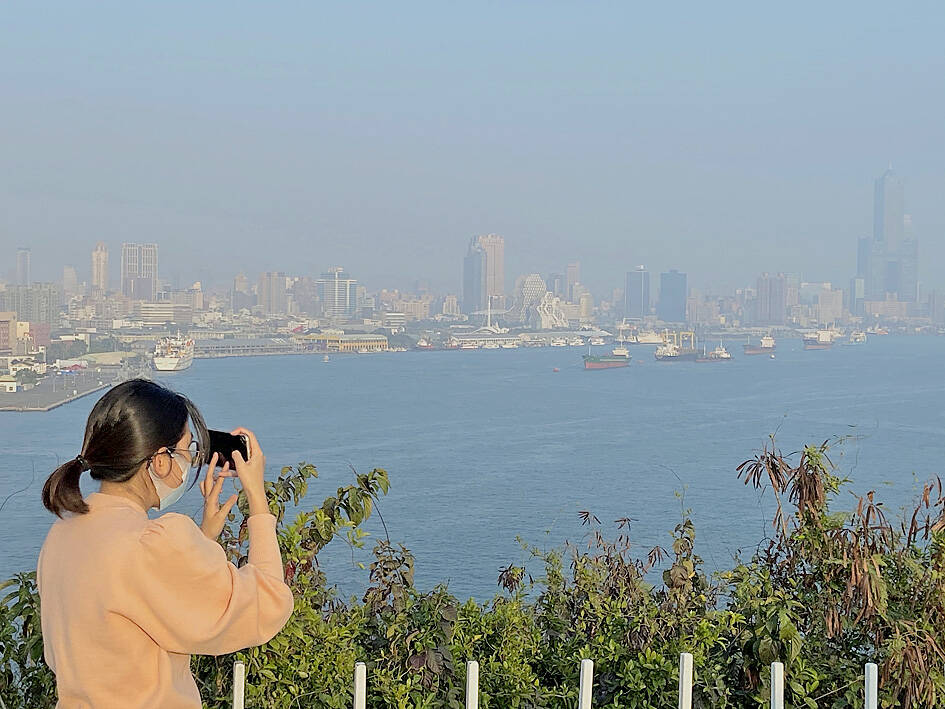Government measures to control air pollution have effectively lowered the density of main pollutants, with more than 90 percent of air quality observation stations reporting a gradual decline in the density of PM2.5 (particulate matter measuring 2.5 micrometers or smaller in diameter), PM10, nitrogen dioxide, sulfur dioxide and carbon monoxide, the National Health Research Institutes (NHRI) said yesterday.
However, only 38 percent of the observation stations showed an improvement in ozone density, associate investigator Chen Yu-cheng (陳裕政) told a news conference to present the results of the institutes’ 10-year study.
Moreover, three stations even reported a gradual increase, he added.

Photo: CNA
The density of PM2.5 fell from 31.7 micrograms per cubic meter (mcg/m3) in 2007 to 21.47mcg/m3, while deaths caused by lung cancer dropped 4.26 percent, Chen said.
Deaths caused by other chronic diseases fell substantially, including 6.91 percent for chronic obstructive pulmonary diseases, 6.56 percent for ischemic heart diseases and 7.31 percent for strokes.
A comparison of the health status of elderly people exposed to an environment with PM2.5 density of 25mcg/m3 with that of 32mcg/m3 showed that their grip strength and muscle mass decreased by 1.7 percent and 1.3 percent respectively, while their body fat increased by 2.4 percent, Chen said.
Based on the study, Taiwan would obtain the maximum benefit between the cost of economic development and the cost of improving public health if it could reduce PM2.5 concentrations to 12.5mcg/m3 — at which point both factors would be equal, Chen said.
If Taiwan hopes to reach the green sustainable development goal set by the UN, in which age-standardized attributable mortality rate caused by PM2.5 should be less than or equal to 18 per 100,000 people, the density should be further reduced to an annual average of 12.1mcg/m3, he said.
The Ministry of Environment on April 29 said that it would revise air quality standards after the results of the NHRI study are released.
The new standard for PM2.5 would be set at 12mcg/m3 after taking into account standards set in other countries, the ministry said.
Meanwhile, the air quality indicator would be revised in the second half of this year as well, it said.

MAKING WAVES: China’s maritime militia could become a nontraditional threat in war, clogging up shipping lanes to prevent US or Japanese intervention, a report said About 1,900 Chinese ships flying flags of convenience and fishing vessels that participated in China’s military exercises around Taiwan last month and in January last year have been listed for monitoring, Coast Guard Administration (CGA) Deputy Director-General Hsieh Ching-chin (謝慶欽) said yesterday. Following amendments to the Commercial Port Act (商港法) and the Law of Ships (船舶法) last month, the CGA can designate possible berthing areas or deny ports of call for vessels suspected of loitering around areas where undersea cables can be accessed, Oceans Affairs Council Minister Kuan Bi-ling (管碧玲) said. The list of suspected ships, originally 300, had risen to about

DAREDEVIL: Honnold said it had always been a dream of his to climb Taipei 101, while a Netflix producer said the skyscraper was ‘a real icon of this country’ US climber Alex Honnold yesterday took on Taiwan’s tallest building, becoming the first person to scale Taipei 101 without a rope, harness or safety net. Hundreds of spectators gathered at the base of the 101-story skyscraper to watch Honnold, 40, embark on his daredevil feat, which was also broadcast live on Netflix. Dressed in a red T-shirt and yellow custom-made climbing shoes, Honnold swiftly moved up the southeast face of the glass and steel building. At one point, he stepped onto a platform midway up to wave down at fans and onlookers who were taking photos. People watching from inside

Japan’s strategic alliance with the US would collapse if Tokyo were to turn away from a conflict in Taiwan, Japanese Prime Minister Sanae Takaichi said yesterday, but distanced herself from previous comments that suggested a possible military response in such an event. Takaichi expressed her latest views on a nationally broadcast TV program late on Monday, where an opposition party leader criticized her for igniting tensions with China with the earlier remarks. Ties between Japan and China have sunk to the worst level in years after Takaichi said in November that a hypothetical Chinese attack on Taiwan could bring about a Japanese

STREAMLINED: The dedicated funding would allow the US to transfer equipment to Taiwan when needed and order upgraded replacements for stockpiles, a source said The US House of Representatives on Thursday passed a defense appropriations bill totaling US$838.7 billion, of which US$1 billion is to be allocated to reinforcing security cooperation with Taiwan and US$150 million to replace defense articles provided to the nation. These are part of the Consolidated Appropriation Act, which the US House yesterday passed with 341 votes in favor and 88 against. The act must be passed by the US Senate before Friday next week to avoid another government shutdown. The US House Committee on Appropriations on Monday unveiled the act, saying that it allocates US$1 billion for the Taiwan Security Cooperation Initiative